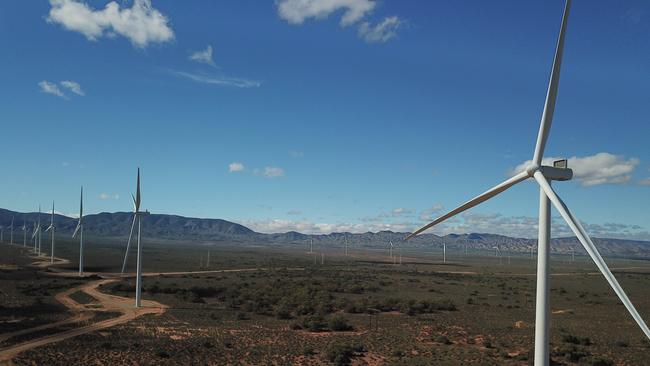Big opportunity as Europe looks for new energy sources to reduce their dependence on Russia
Fortescue Future Industries’ Guy Debelle says Australia risks missing out on opportunities to export to Europe if the Albanese government falls behind others in supporting the industry.
Australia risks squandering a “huge opportunity” to become a green energy powerhouse if the Albanese government falls behind other governments in supporting the local industry, Fortescue Future Industries chief financial officer Guy Debelle says.
But he warned that it risked “having the rug pulled” from underneath it, as other governments around the world pushed ahead with more incentives for development of green energy.
The former deputy governor of the Reserve Bank, who joined billionaire Andrew Forrest’s green energy arm Fortescue Future Industries earlier this year, said countries like Germany were now looking for new sources of energy to reduce their dependence on Russian gas.
Mr Debelle said Australia had a substantial comparative advantage in the development of green energy with its abundant supplies of sun and wind and large land mass.
“We can build large scale (green energy) opportunities as we have the land mass in a way which Europe doesn’t,” Mr Debelle told the Citi Australia and New Zealand Investment Conference in Sydney on Thursday.
“There is a huge opportunity for us to export green energy into Europe.”

Mr Debelle said FFI had reached an agreement last week to invest in a green energy import terminal at Wilhelmshaven in Germany, a project being done in conjunction with other partners including German based utility giant, E. ON, one of the largest energy companies in Europe.
“We (FFI) have signed a memorandum of understanding with E. ON which reflects their very large demand for green energy,” he said.
“There are plenty more E. ONs in Europe.
“There is a large demand for green energy.
“The German Government is pushing this really hard because of their energy crisis and their dependency on Russian gas which is accelerating their green energy transformation.”
But Mr Debelle said Australia risked being left behind in its development of green energy, including green hydrogen, because of incentives being given by governments in other countries, particularly in Europe and the US.
He said more investment was needed in Australia to help the development of green hydrogen at scale.
President Joe Biden’s recent Inflation Reduction Act in the US had provided significant incentives for the development of green hydrogen, Mr Debelle said.
“The Inflation Reduction Act has turbo charged the US market,” he said.
“The size of the subsidies is pretty significant.”
Mr Debelle said the subsidies in the act brought the cost of energy from green hydrogen below the cost of fossil fuels in the US.
He said Europe was also planning a “legislative framework” which would also encourage more development of green hydrogen.
“The risk, in Australia, is that we could have the rug pulled out from under us if other countries get there first,” he said.
He said Australia had a “first mover advantage” in green hydrogen and would eventually develop its industry.
But he said it could lose out on the potential markets in Europe if lack of incentives in Australia meant that investment capital was “diverted elsewhere.”
Mr Debelle said Australia did not need to have an official “price on carbon.”
He said there was considerable political baggage now associated with the idea given the political problems it had created for former political leaders including Malcolm Turnbull.
He said other government policies including subsidies and tax incentives and legislation could achieve similar outcomes.
But Mr Debelle said companies should develop their own internal price on carbon as they considered future investment opportunities.
“From a business point of view, you have to be internalising the carbon price in your investment decisions.”




To join the conversation, please log in. Don't have an account? Register
Join the conversation, you are commenting as Logout